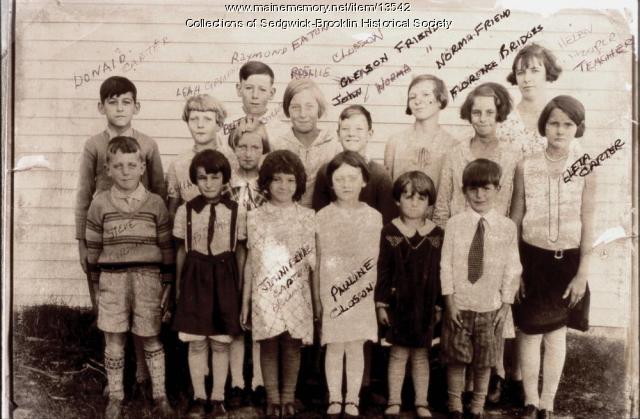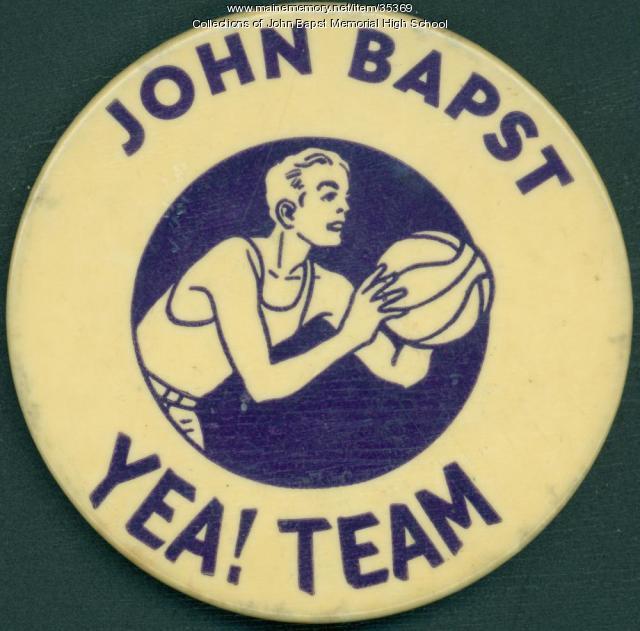Keywords: Fires
- Historical Items (1799)
- Tax Records (11)
- Architecture & Landscape (24)
- Online Exhibits (138)
- Site Pages (486)
- My Maine Stories (39)
- Lesson Plans (1)
Online Exhibits
Your results include these online exhibits. You also can view all of the site's exhibits, view a timeline of selected events in Maine History, and learn how to create your own exhibit. See featured exhibits or create your own exhibit
Exhibit
Good Will-Hinckley: Building a Landscape
The landscape at the Good Will-Hinckley campus in Fairfield was designed to help educate and influence the orphans and other needy children at the school and home.
Exhibit
Reading, Writing and 'Rithmetic: Brooklin Schools
When Brooklin, located on the Blue Hill Peninsula, was incorporated in 1849, there were ten school districts and nine one-room school houses. As the years went by, population changes affected the location and number of schools in the area. State requirements began to determine ways that student's education would be handled. Regardless, education of the Brooklin students always remained a high priority for the town.
Exhibit
A Snapshot of Portland, 1924: The Taxman Cometh
In 1924, with Portland was on the verge of profound changes, the Tax Assessors Office undertook a project to document every building in the city -- with photographs and detailed information that provide a unique view into Portland's architecture, neighborhoods, industries, and businesses.
Exhibit
Public education has been a part of Maine since Euro-American settlement began to stabilize in the early eighteenth century. But not until the end of the nineteenth century was public education really compulsory in Maine.
Exhibit
George Henry Preble of Portland, nephew of Edward Preble who was known as the father of the U.S. Navy, temporarily lost his command during the Civil War when he was charged with failing to stop a Confederate ship from getting through the Union blockade at Mobile.
Exhibit
Mainers, like residents of other states, had differing views about slavery and abolition in the early to mid decades of the 19th century. Religion and economic factors were among the considerations in determining people's leanings.
Exhibit
John Bapst High School was dedicated in September 1928 to meet the expanding needs of Roman Catholic education in the Bangor area. The co-educational school operated until 1980, when the diocese closed it due to decreasing enrollment. Since then, it has been a private school known as John Bapst Memorial High School.
Exhibit
Music in Maine - Bluegrass Music
"Event Records operated until 1962 when a fire destroyed the warehouse of its Boston distributor, putting Event Records out of business."
Exhibit
These stories -- that stretch from 1999 back to 1759 -- take you from an amusement park to the halls of Congress. There are inventors, artists, showmen, a railway agent, a man whose civic endeavors helped shape Portland, a man devoted to the pursuit of peace and one known for his military exploits, Maine's first novelist, a woman who recorded everyday life in detail, and an Indian who survived a British attack.
Exhibit
We Used to be "Normal": A History of F.S.N.S.
Farmington's Normal School -- a teacher-training facility -- opened in 1863 and, over the decades, offered academic programs that included such unique features as domestic and child-care training, and extra-curricular activities from athletics to music and theater.
Exhibit
Harry Lyon: An Old Sea Dog Takes to the Air
Through a chance meeting, Harry Lyon of Paris Hill became the navigator on the 1928 flight of the Southern Cross, the first trans-Pacific flight. His skill as a navigator, despite his lack of experience, was a key factor on the flight's success.
Exhibit
Promoting Rockland Through a Stereopticon, 1875
Frank Crockett and photographer J.P. Armbrust took stereo views of Rockland's downtown, industry, and notable homes in the 1870s as a way to promote tourism to the town.
Exhibit
Paper has shaped Maine's economy, molded individual and community identities, and impacted the environment throughout Maine. When Hugh Chisholm opened the Otis Falls Pulp Company in Jay in 1888, the mill was one of the most modern paper-making facilities in the country, and was connected to national and global markets. For the next century, Maine was an international leader in the manufacture of pulp and paper.
Exhibit
Most societies have had rituals or times set aside to honor ancestors, those who have died and have paved the way for the living. Memorial Day, the last Monday in May, is the day Americans have set aside for such remembrances.
Exhibit
Liberty Threatened: Maine in 1775
At Lexington and Concord, on April 19, 1775, British troops attempted to destroy munitions stored by American colonists. The battles were the opening salvos of the American Revolution. Shortly, the conflict would erupt in Maine.
Exhibit
Home Ties: Sebago During the Civil War
Letters to and from Sebago soldiers who served in the Civil War show concern on both sides about farms and other issues at home as well as concern from the home front about soldiers' well-being.
Exhibit
Throughout the history of the state, residents have protested, on paper or in the streets, to increase rights for various groups, to effect social change, to prevent social change, or to let their feelings be known about important issues.
Exhibit
Baseball often is called the National Pastime. For many people, baseball is encountered in the backyard and down the street, a game played by a few or the full contingent of a team.
Exhibit
When America entered the Great War in 1917, the government sent out pleas for help from American women, many of whom responded at the battle front and on the home front.
Exhibit
A Town Is Born: South Bristol, 1915
After being part of the town of Bristol for nearly 150 years, residents of South Bristol determined that their interests would be better served by becoming a separate town and they broke away from the large community of Bristol.
Exhibit
John Y. Merrill: Leeds Farmer, Entrepreneur, & More
John Y. Merrill of Leeds (1823-1898) made terse entries in diaries he kept for 11 years. His few words still provide a glimpse into the life of a mid 18th century farmer, who also made shoes, quarried stone, moved barns, made healing salves -- and was active in civic affairs.
Exhibit
Walter Wyman's vision to capture the power of Maine's rivers to produce electricity led to the formation of Central Maine Power Co. and to a struggle within the state over what should happen to the power produced by the state's natural resources.
Exhibit
Scarborough: They Answered the Call
Scarborough met every quota set by the state for supplying Civil War soldiers for Union regiments. Some of those who responded became prominent citizens of the town.
Exhibit
Photojournalism & the 1936 Flood
Photojournalism & the 1936 Flood examines the monumental destruction caused by the historic flood of 1936 through the comprehensive and innovative photojournalism done by the Guy Gannett Publishing Company in the weeks surrounding the flood.
























